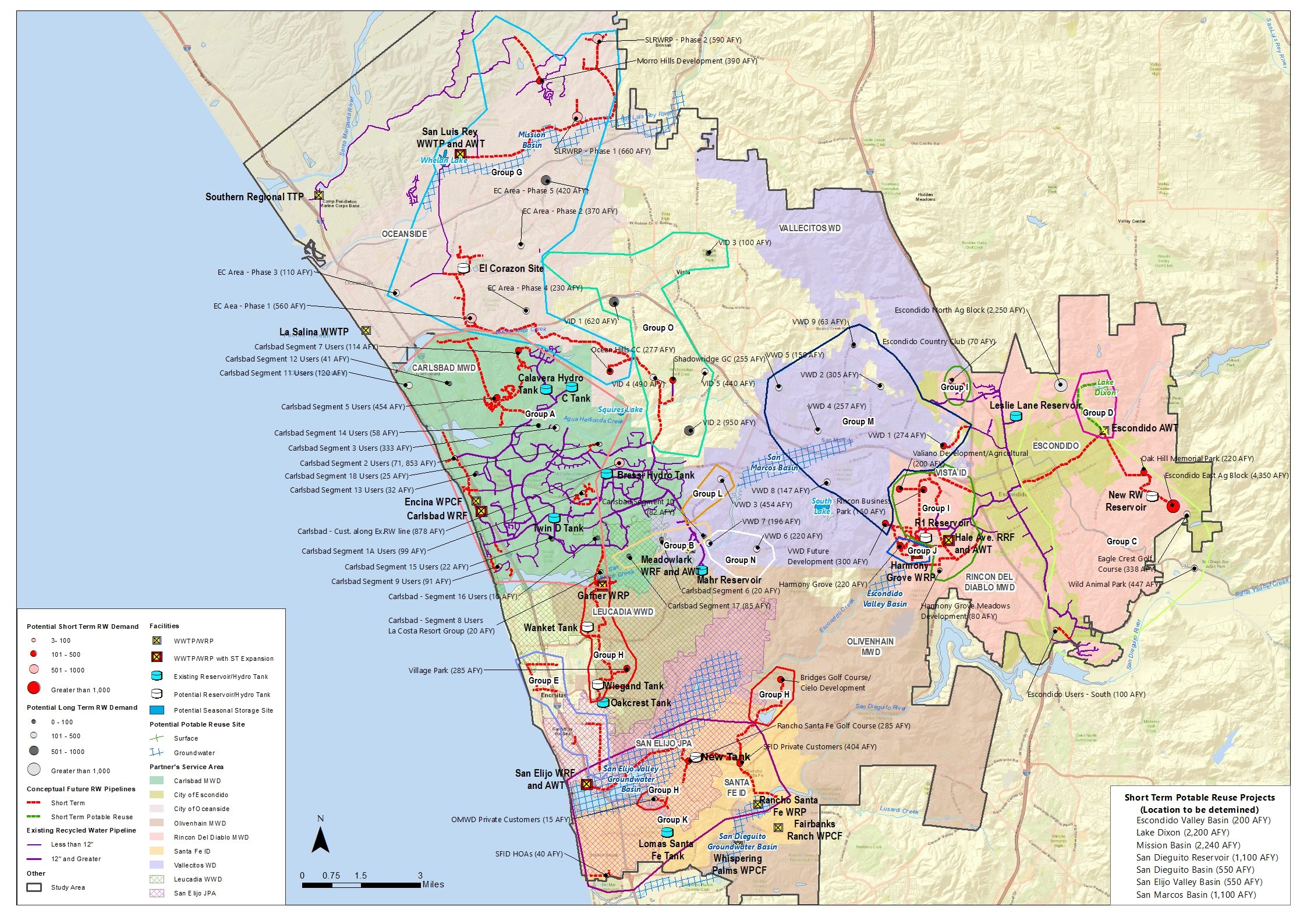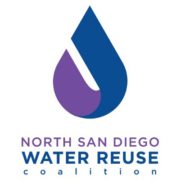The North San Diego Water Reuse Coalition was awarded a grant of up to $17.8 million for the development of recycled water infrastructure. The grant funds come from the U.S. Bureau of Reclamation.
“As we face increasingly devastating drought conditions, it’s imperative that we continue to diversify our water supplies and strengthen our local water independence,” said U.S. Representative Mike Levin. “The North San Diego Water Reuse Coalition plays a critical role in that effort, which is why I am proud to see the Bipartisan Infrastructure Law funding investments for their important work to expand the use of recycled water.”
This is the second grant that the USBR has awarded to the North County coalition in the last year. In August 2021, USBR committed $6.1 million in funds from its Title XVI program for local water reclamation and reuse projects. The two grant awards totaling up to $23.9 million will help cover costs for work performed through September 2025.
New water recycling projects
“California is not going to be able to navigate another historic drought if we don’t develop new water supplies, said Larry Watt, Olivenhain Municipal Water District’s Board President. “In fact, the number one priority in the California Water Supply Strategy document that Governor Newsom recently released is to create new water recycling projects. This financial support from the Bureau of Reclamation is instrumental for us to be able to develop these new supplies and achieve statewide goals.”
Water agencies work to increase local supply sources
The coalition is a group of nine water and wastewater agencies in San Diego County working beyond jurisdictional boundaries to maximize recycled water use and reduce demand for imported water. The awarded funding is for the coalition’s Regional Recycled Water Program: 2020 Project, which is a joint effort between coalition members to expand recycled water infrastructure to increase and maximize water reuse in the region. Upon completion of all long-term project elements, the coalition anticipates increasing water reuse by 11 billion gallons per year. This equates to approximately 31 million gallons per day of recycled water and potable reuse water added to northern San Diego’s water supply portfolio.
The project includes connecting discrete recycled water systems to one another, new pipelines, increasing recycled water storage capacity, installation of new pump stations, and other project components that will help distribute recycled water to effectively meet demands.
“For the Vallecitos Water District, the additional funding will be used to increase the size of the chlorine contact stage at our Meadowlark Water Reclamation Facility,” noted Craig Elitharp, Vallecitos Water District Board President. “We will be able to increase the capacity of Meadowlark from 5 million gallons a day to 6.5 million gallons a day. This additional reclaimed water supply will be passed along to our water reuse partners with the City of Carlsbad and the Olivenhain Municipal Water District.”

The project includes connecting discrete recycled water systems to one another, new pipelines, increasing recycled water storage capacity, installation of new pump stations, and other project components that will help distribute recycled water to effectively meet demands. Graphic: North San Diego Water Reuse Coalition
Drought-proof supply
The project helps address water supply shortages by offering the region a reliable approach for supplementing local and imported supplies. Potable water supplies are vulnerable during drought periods and can be restricted during times of water shortages. Recycled water is considered a drought-proof supply because it is not linked to weather fluctuations and is available year-round, effectively offsetting potable water demand. Furthermore, since recycled water is produced locally, it cannot be disrupted from shortages caused by earthquakes, wildfires, and other natural disasters that may occur in other parts of the state.
Investments in water infrastructure
“We are grateful for this partnership with the U.S. Bureau of Reclamation to help fund green infrastructure,” said Kellie Hinze, San Elijo Joint Powers Authority Chairwoman and Encinitas City Council Member. “Recycling water reduces our dependence on imported supplies while building resiliency for a changing climate.”
Investments in water infrastructure, such as the infrastructure expanded by this project, promotes economic development and expanded business opportunities. According to the San Diego Regional Economic Development Corporation, for every $1 invested in water infrastructure, there is an estimated $1.80 increase in the region’s gross regional product.
Additional benefits associated with the project come from reduced wastewater discharges and associated coastal stressors. Reducing the amount of wastewater discharged to the Pacific Ocean can benefit water quality along the coast in the coalition’s service area.
Recycled water infrastructure
In addition to federal funds, the project has previously received funding at the state level from the Department of Water Resources. The project received grant funding on several occasions through DWR’s Integrated Regional Water Management Program—administered locally in partnership with the San Diego County Water Authority, County of San Diego, and City of San Diego—which supports collaborative water management to increase regional self-reliance throughout California. These IRWM awards have totaled $4.95 million in grant funding.
Through the Title XVI Water Reclamation and Reuse Program, the USBR provides financial and technical assistance to local water agencies for the planning, design, and construction of water reclamation and reuse projects. These projects are designed to provide growing communities with new sources of water which increases water management flexibility and makes our water supply more reliable. The coalition will be working with USBR to finalize the grant agreement in the coming months.
More information about the coalition and the project is available at www.nsdwrc.org.
The North San Diego Water Reuse Coalition is comprised of nine northern San Diego County water and wastewater agencies working beyond jurisdictional boundaries to maximize recycled water use and reduce demand for imported water. The Coalition partners include Olivenhain Municipal Water District, Carlsbad Municipal Water District, City of Oceanside, Vallecitos Water District, City of Escondido, Rincon del Diablo Municipal Water District, Santa Fe Irrigation District, Leucadia Wastewater District, and San Elijo Joint Powers Authority.
(Editor’s note: The Santa Fe Irrigation District, Vallecitos Water District, Olivenhain Municipal Water District, Rincon del Diablo Municipal Water District, Carlsbad Municipal Water District, City of Escondido, and City of Oceanside, are seven of the San Diego County Water Authority’s 24 member agencies that deliver water across the metropolitan San Diego region.)






